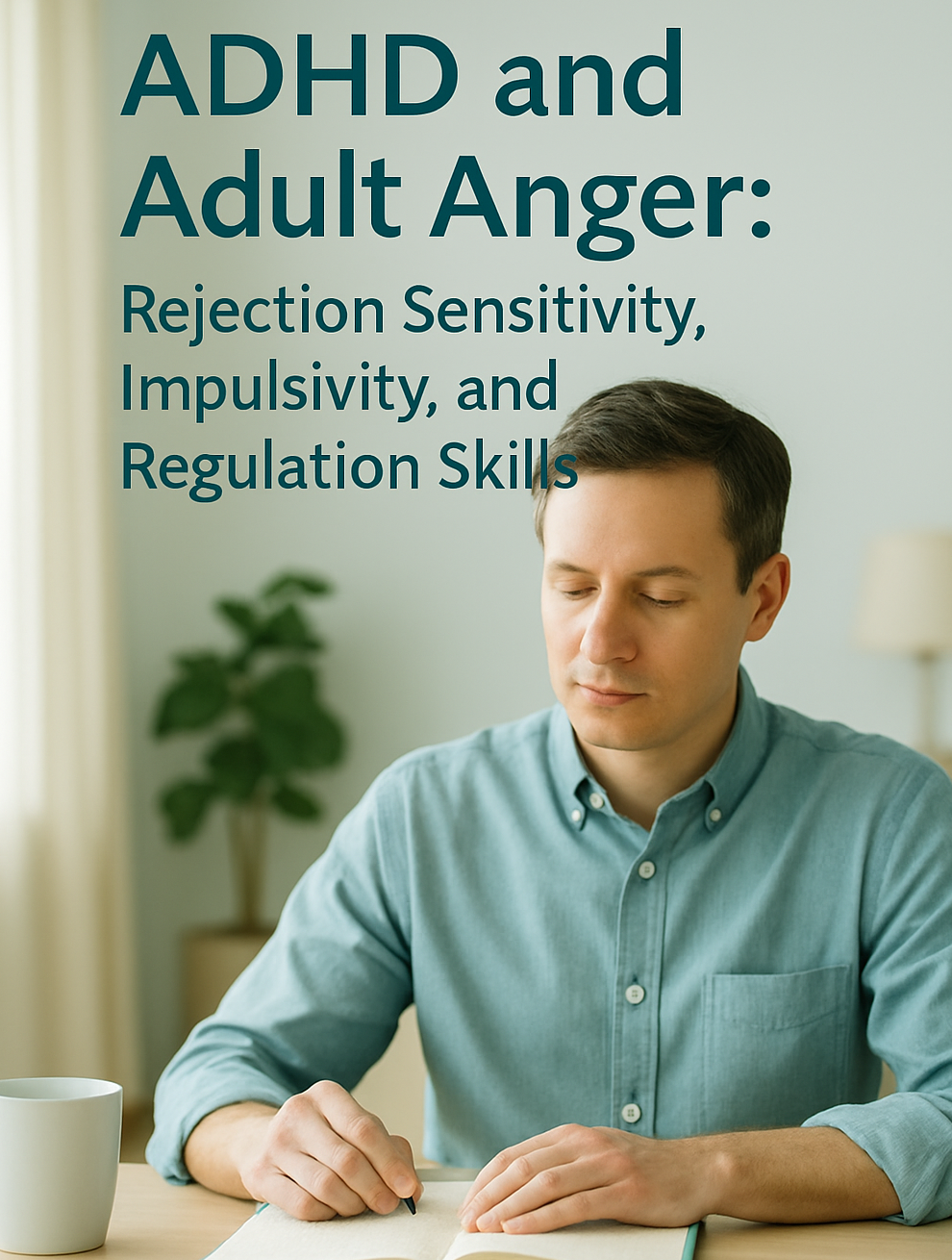Why Adults With ADHD Experience Anger Differently
Many adults with ADHD describe their anger as fast, intense, and overwhelming—a surge that seems to come “out of nowhere.”
You might feel calm one moment, then suddenly flooded by irritation after a comment, interruption, or unexpected change of plans.
This isn’t a character flaw.
ADHD affects the brain systems responsible for emotional regulation, impulse control, and executive functioning, making anger harder to manage and harder to recover from.
If you’ve ever been told you’re “too sensitive,” “overreacting,” or “always on edge,” you’re not alone. Emotional dysregulation is one of the most misunderstood—and most treatable—parts of ADHD.
The ADHD–Anger Connection: What’s Really Going On?
1. Rejection Sensitivity Dysphoria (RSD)
Many adults with ADHD experience intense emotional pain or anger when they perceive rejection or criticism—even unintentionally.
RSD can trigger:
- Sudden anger or defensiveness
- Feelings of humiliation
- Avoidance of feedback
- Relationship tension
It’s not the criticism itself—it’s the brain’s heightened sensitivity to emotional threat.
2. Impulsivity and Fast-Reaction Emotions
ADHD brains often react before they process.
Impulsivity can cause:
- Snapping during conversations
- Sending regrettable texts or emails
- Interrupting with irritation
- Difficulty pausing before responding
The emotional “brake system” simply engages a bit slower.
3. Emotional Flooding and Slow Recovery
Adults with ADHD frequently experience:
- Rapid escalation
- Feeling overwhelmed
- Difficulty calming down once triggered
Once the nervous system is activated, returning to baseline can take longer than it does for neurotypical individuals.
4. Cognitive Overload and Low Frustration Tolerance
Executive functioning challenges mean daily life requires more mental effort.
When the brain is already overloaded, even small frustrations feel unmanageable.
Examples:
- Loud environments
- Interruptions at work
- Shifts in plans
- Being asked to multitask
Anger becomes the brain’s way of signaling, “This is too much.”
Common Triggers for Adult ADHD Anger
- Feeling criticized or micromanaged
- Being interrupted or talked over
- Disorganized spaces or chaotic environments
- Missed expectations
- Being rushed
- Sensory overload
- Technology friction (emails, notifications, glitches)
- Shame from past mistakes
Once you identify your specific triggers, you can intervene before anger escalates.
Regulation Skills: How to Manage ADHD-Related Anger Effectively
These techniques blend cognitive-behavioral strategies, ADHD-friendly tools, and therapeutic approaches used in clinical practice.
1. The Two-Minute Pause (Impulse Reset)
When you notice a reaction beginning:
- Pause.
- Step away or turn off your screen.
- Take 6 slow breaths.
- Return only when your body softens.
This micro-pause interrupts impulsive responses that cause regret.
2. Label the Emotion (Name to Tame)
Putting words to the feeling activates the brain’s language centers, reducing emotional intensity.
Try:
- “I’m feeling overwhelmed.”
- “This feels like rejection.”
- “I’m getting flooded.”
Clarity brings control.
3. Body-Based Regulation (ADHD-Friendly)
ADHD brains respond quickly to physical interventions:
- 30-second cold water splash
- Stepping outside for fresh air
- Slow stretching
- Pacing for 1–2 minutes
- Applying pressure to your palms or thighs
These methods downshift the nervous system faster than thinking-based strategies alone.
4. Rejection Sensitivity Scripts
Prepare simple phrases to use when RSD hits:
- “I know this feels personal, but I want to check before assuming.”
- “Can you clarify? I may be interpreting this as criticism.”
- “I want to hear your feedback—I just need a moment first.”
Scripts help replace automatic defensiveness with curiosity.
5. Environmental Adjustments
Small shifts prevent sensory overload:
- Noise-canceling headphones
- Soft lighting
- Organized desk surfaces
- Reduced notifications
- Scheduled “transition buffers” between tasks
ADHD anger decreases dramatically when the environment demands less constant regulation.
6. Hypnotherapy for Emotional Regulation
Hypnosis helps adults with ADHD by:
- Reinforcing calm response patterns
- Reducing emotional reactivity
- Softening the intensity of RSD
- Strengthening executive functioning and focus
- Improving resilience after triggers
During hypnotherapy, clients practice internal strategies for calm, visualization exercises, and subconscious reframing—creating long-term shifts in emotional control.
7. CBT and ADHD Coaching Integration
Cognitive-Behavioral Therapy (CBT) complements hypnosis by teaching:
- Thought reframing
- Trigger mapping
- Accountability routines
- Communication skills for partners and coworkers
ADHD coaching adds structure and external support to maintain new habits.
When Anger Affects Work or Relationships
You might benefit from professional support if:
- You snap at loved ones and regret it later
- Criticism feels unbearable
- Conflict escalates quickly
- You withdraw or shut down after arguments
- Anger affects your job performance
- Shame follows emotional reactions
These patterns are treatable—and often improve quickly with targeted interventions.
Anger Doesn’t Have to Control Your Life
ADHD affects emotional circuits in the brain, but with the right tools, you can build a calm, empowered way of responding.
Anger becomes a message, not a meltdown. A signal, not a spiral.
At Blossom Hypnosis in Rochester, NY, we help adults with ADHD regulate emotions, strengthen resilience, and reduce anger reactivity using hypnotherapy, CBT, and evidence-based approaches.
Ready to gain control over ADHD-related anger?
Book a Free Consultation →


Be First to Comment